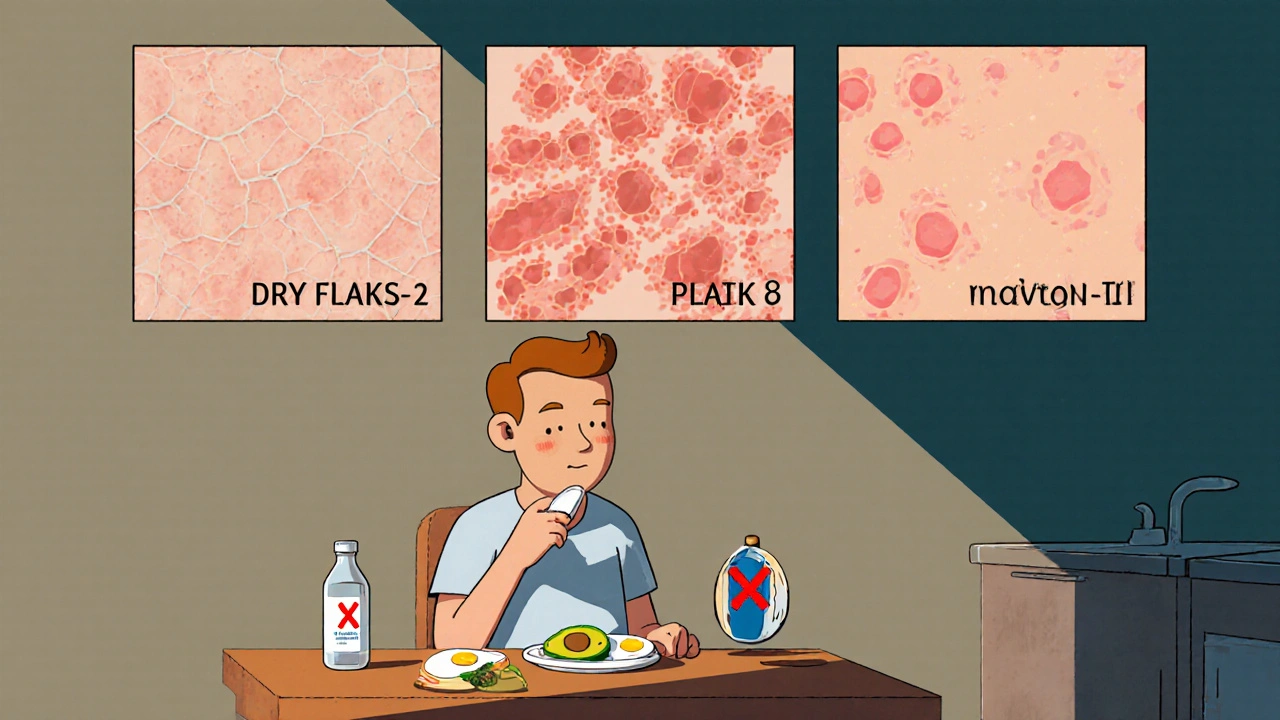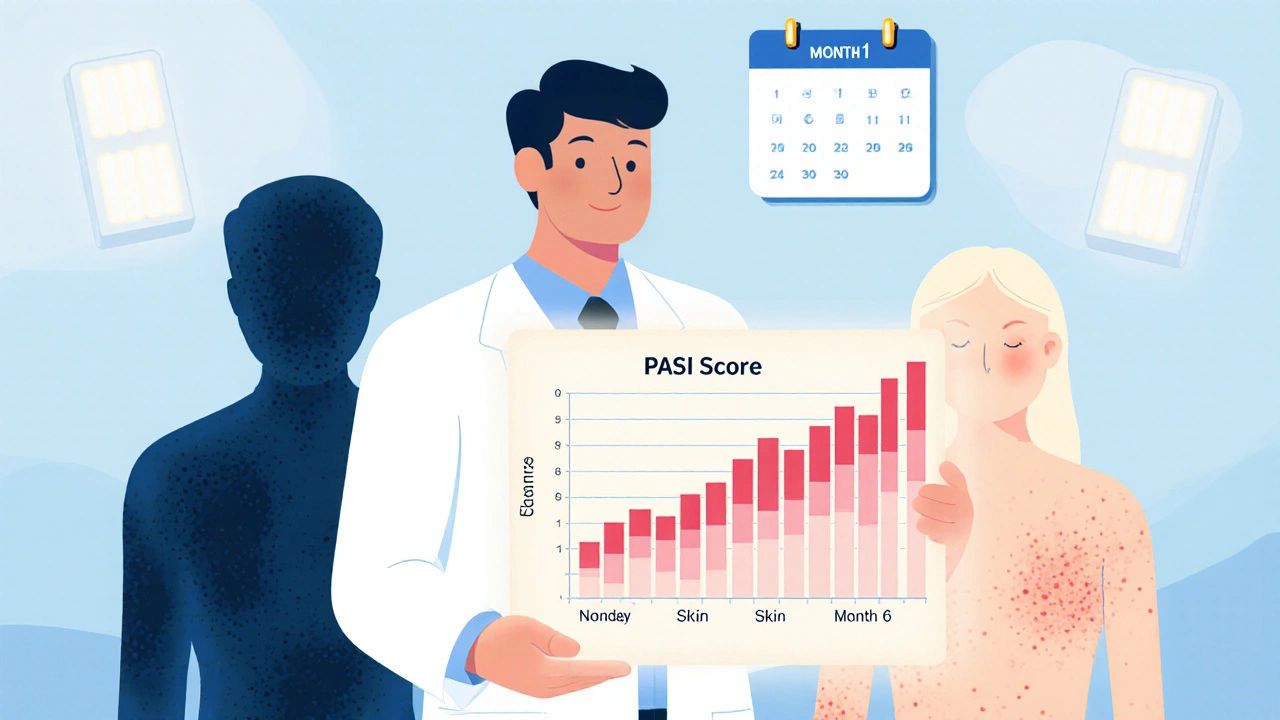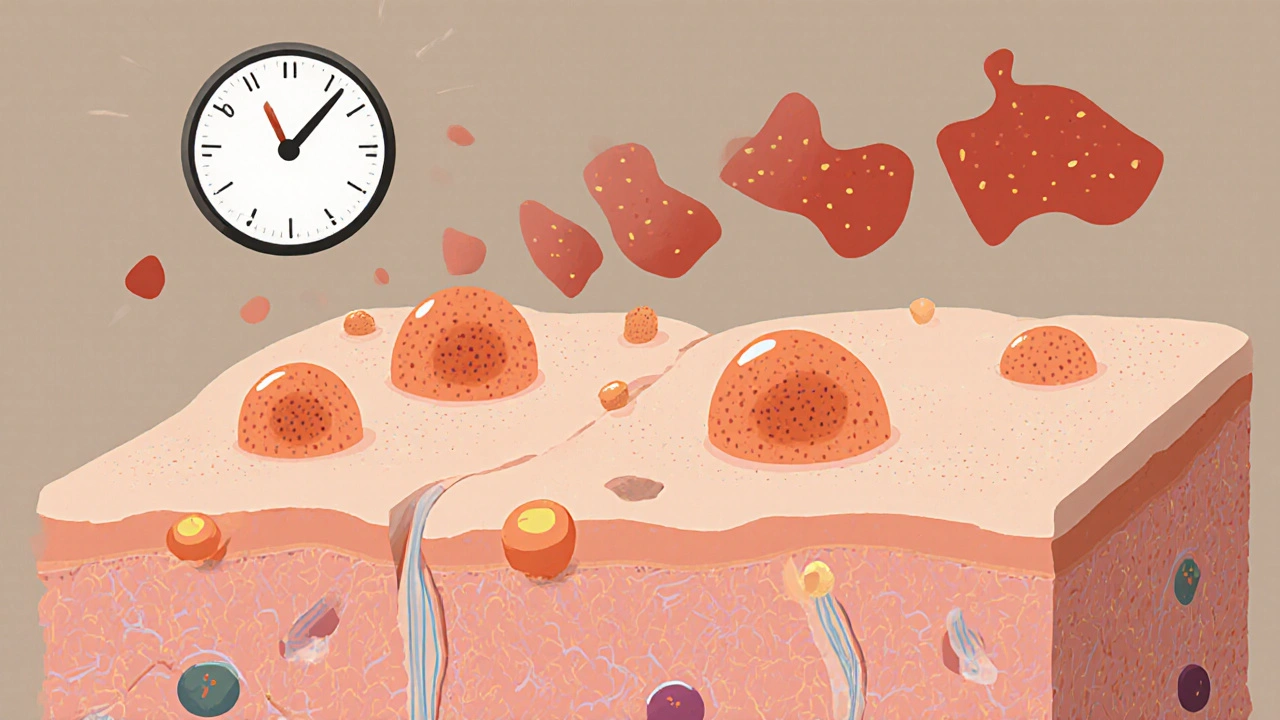Acitretin doesn’t work overnight. If you’ve just started taking it for psoriasis, you’re probably wondering when you’ll actually see a difference. The short answer? Most people notice some improvement after 4 to 6 weeks, but full results can take 3 to 6 months. It’s not a quick fix - it’s a slow, steady rebuild of your skin.
Why Acitretin Takes So Long to Work
Acitretin is a retinoid, a synthetic version of vitamin A. It doesn’t kill skin cells or suppress your immune system like some other psoriasis drugs. Instead, it slows down how fast your skin cells grow. In psoriasis, skin cells multiply too quickly - they pile up on the surface in days instead of weeks, forming thick, scaly plaques. Acitretin resets that clock.
But your skin doesn’t turn over overnight. It takes about 28 days for a new skin cell to move from the bottom layer to the surface. Even when acitretin starts working, it needs multiple cycles of this process before the old, inflamed skin is fully replaced. That’s why you won’t see clear skin after two weeks. You’re waiting for your body to finish the job.
What to Expect Week by Week
Here’s what most patients actually experience:
- Weeks 1-2: Little to no change. Some people even feel worse - skin might feel drier, more irritated, or flaky. This isn’t the drug failing. It’s your skin adjusting.
- Weeks 3-6: First signs of improvement. Redness starts to fade. Scales become thinner. Itching lessens. You might notice small patches clearing up, especially on elbows or knees.
- Weeks 7-12: Noticeable reduction in plaque thickness. Skin begins to look smoother. Many patients report being able to cut their moisturizer use in half by now.
- Months 3-6: Peak results. Up to 70% of patients see at least a 75% improvement in their Psoriasis Area and Severity Index (PASI) score by this point. Some achieve near-clear skin.
A 2023 study in the British Journal of Dermatology tracked 182 psoriasis patients on acitretin. By week 12, 58% had a 50% or better improvement. By month 6, that jumped to 82%. The ones who stopped early - before 12 weeks - were the ones who gave up too soon.
Factors That Change the Timeline
Not everyone responds the same. Your timeline depends on:
- Dose: Most start at 25 mg per day. Higher doses (up to 50 mg) can speed things up slightly, but they also raise the risk of side effects like dry lips or elevated cholesterol.
- Psoriasis type: Plaque psoriasis responds best. Pustular or erythrodermic psoriasis may need longer - sometimes over 6 months.
- Body weight: Heavier patients often need higher doses to see results. Your doctor may adjust your dose based on weight and response.
- Previous treatments: If you’ve used other systemic drugs like methotrexate or cyclosporine before, your skin might respond faster to acitretin.
- Alcohol use: Even small amounts of alcohol can turn acitretin into a long-lasting form in your body. This increases side effects and can delay results. You need to avoid alcohol completely while on this drug - and for at least 2 years after stopping.

When to Talk to Your Doctor
It’s normal to feel frustrated if you don’t see results after 8 weeks. But don’t quit. Acitretin is one of the few oral drugs that can lead to long-term remission - especially if you stick with it.
Call your doctor if:
- Your skin gets worse after 6 weeks with no improvement at all
- You develop severe dryness, cracked lips, or eye irritation that doesn’t improve with moisturizer
- You notice yellowing of the skin or eyes - a sign of liver stress
- You’re planning to get pregnant - acitretin causes serious birth defects and must be stopped at least 3 years before conception
Don’t increase your dose on your own. More isn’t always better. The side effects can outweigh the benefits.
How to Speed Up Results (Safely)
You can’t rush acitretin, but you can support it:
- Use a thick moisturizer daily. Look for ceramides, urea, or lactic acid. These help repair your skin barrier while acitretin works.
- Take it with food. Acitretin absorbs better when taken with a meal that has fat in it - like eggs, avocado, or olive oil.
- Use gentle cleansers. Harsh soaps dry out your skin and make side effects worse.
- Get your blood tested. Your doctor will check liver enzymes and cholesterol every 4-8 weeks. High levels can mean you need a dose adjustment.
- Combine with light therapy. Many dermatologists pair acitretin with narrowband UVB. This combo often cuts treatment time in half.

What Happens After You Stop?
Acitretin doesn’t cure psoriasis. It controls it. Once you stop, psoriasis can come back - usually within 3 to 6 months. But here’s the good part: patients who’ve taken acitretin for 6 months or longer often have milder flare-ups when it returns. Some even go a year or more without needing another treatment.
If your psoriasis returns, your doctor might restart acitretin - or switch you to a biologic. Many patients use acitretin as a bridge - to get control fast - before moving to longer-term options.
Real Patient Stories
One woman from Sheffield, 42, had plaque psoriasis covering 30% of her body. She started acitretin at 25 mg. After 10 weeks, her plaques were half the size. By 5 months, she was 90% clear. She kept going for 8 months, then stopped. Her skin stayed clear for 14 months before a mild flare.
A man from Manchester, 58, tried acitretin after failing with topical steroids. He saw no change at 8 weeks. He almost quit - but his doctor encouraged him to wait. At 16 weeks, his nails stopped pitting, his scalp cleared, and he stopped using 4 different creams. He’s been on acitretin for 18 months now, with no major side effects.
These aren’t outliers. They’re typical - if you give it time.
Final Takeaway
Acitretin isn’t fast. But it’s one of the most effective oral treatments for moderate to severe plaque psoriasis. It doesn’t just cover up symptoms - it changes how your skin grows. If you’re patient, you’ll likely see results that last. If you give up too early, you’ll miss out.
Stick with it. Track your progress with photos every 4 weeks. Talk to your doctor regularly. And remember: your skin isn’t broken - it’s just out of sync. Acitretin helps it find its rhythm again.
How long does it take for acitretin to start working for psoriasis?
Most patients begin to see improvement between 4 and 6 weeks, but full results usually take 3 to 6 months. Skin cell turnover takes time, and acitretin works by gradually slowing down the overproduction of skin cells that cause plaques.
Can acitretin cure psoriasis?
No, acitretin doesn’t cure psoriasis. It controls the condition by regulating skin cell growth. Once you stop taking it, psoriasis often returns within 3 to 6 months. However, many patients experience milder flare-ups afterward and may go longer between treatments.
Why is my psoriasis worse after starting acitretin?
It’s common to experience a temporary worsening - known as a flare - in the first few weeks. This happens because acitretin speeds up the shedding of old, inflamed skin cells before new, healthier ones replace them. Keep using the medication and moisturize heavily. This usually improves by week 4-6.
Can I drink alcohol while taking acitretin?
No. Alcohol interacts with acitretin and can cause it to stay in your body much longer - increasing the risk of serious side effects like liver damage and birth defects. You must avoid alcohol completely while taking acitretin and for at least 2 years after stopping.
What should I do if acitretin isn’t working after 3 months?
Talk to your dermatologist. They may adjust your dose, check your liver and cholesterol levels, or combine acitretin with light therapy. If there’s still no improvement after 6 months, they might switch you to a biologic or another systemic medication.


Comments (14)
S Love
October 31, 2025 AT 03:18Just wanted to say this post is one of the clearest, most well-researched explanations of acitretin I’ve ever seen. Seriously, thank you for breaking down the timeline so precisely. So many people quit at week 6 because they think it’s not working - but this? This is the kind of info that saves people from giving up too soon.
Also, the part about taking it with fat? Game changer. I didn’t know that. I’ve been taking it on an empty stomach for weeks. Time to adjust.
And the 2-year alcohol ban? Yeah, that’s non-negotiable. I’ve seen too many people ruin their liver trying to ‘just have one beer.’ It’s not worth it.
Billy Tiger
November 1, 2025 AT 09:26Acitretin takes 6 months to work and you still have to avoid alcohol for 2 years after
why not just take methotrexate like everyone else
at least that one you can drink around
Jim Peddle
November 1, 2025 AT 23:34Interesting how this post frames acitretin as some kind of slow miracle when in reality it’s just a vitamin A analog with a 30-year-old mechanism. The real story is that the pharmaceutical industry has been milking this drug for decades because it’s cheap to produce and patients are too desperate to question it.
And let’s not ignore the fact that the 70% improvement statistic is based on PASI scores - a metric designed to make drugs look good. Real people don’t measure their lives in percentages of skin clearance. They measure it in whether they can wear shorts again.
Also, the study cited? 182 patients. That’s not a trial. That’s a focus group with a lab coat.
John Concepcion
November 2, 2025 AT 15:52Bro you literally said you’re gonna wait 6 months for a drug that makes your lips crack like a desert and you’re still gonna take it?
what kind of masochist are you
just get a biologic already
they work in 2 weeks and you can drink wine after
why are you suffering like this
Katie Ring
November 4, 2025 AT 09:25It’s funny how people act like acitretin is some ancient torture device. It’s not. It’s a tool. And like any tool, you have to use it right. You don’t complain about a hammer because it doesn’t build a house in five minutes - you learn how to swing it.
And yes, the side effects suck. But they’re manageable. Dry skin? Moisturize. Lips crack? Use ointment. Liver numbers up? Adjust dose. This isn’t magic. It’s medicine.
And if you’re not willing to wait six months for your skin to stop screaming at you… then maybe psoriasis isn’t your biggest problem.
Oliver Myers
November 5, 2025 AT 02:29Just wanted to say - if you’re reading this and you’re on acitretin and you’re feeling discouraged… you’re not alone.
I started this drug last January. Week 3? I cried because my skin looked worse. Week 8? I almost quit. Week 14? I wore a tank top for the first time in 5 years.
It’s not glamorous. It’s not fast. But it’s real. And if you’re still here reading this? You’re already winning.
Keep going. You’ve got this. And if you need someone to talk to - I’m here. No judgment. Just solidarity.
Also - please, please, please use a ceramide cream. My dermatologist gave me one for free and it saved me from total lip apocalypse.
Pritesh Mehta
November 6, 2025 AT 14:51Let me tell you something about Western medicine - it’s all about control, not cure. Acitretin doesn’t cure psoriasis because the system doesn’t want to cure it. A cured patient is a lost customer. A chronic patient? That’s recurring revenue. That’s quarterly earnings. That’s Wall Street dividends.
Meanwhile, in Ayurveda, we’ve had herbal formulations like Khadirarishta and Manjishtha for centuries - they balance the doshas, detoxify the blood, and restore skin harmony without destroying your liver or banning your social life.
But no, we must swallow synthetic retinoids because ‘science says so.’ Science? What science? The same science that told us trans fats were healthy?
Wake up. Your body isn’t a machine. It’s a living system. And you’re being sold a band-aid dressed as a solution.
Adarsha Foundation
November 6, 2025 AT 17:55I appreciate both sides here - the Western medical perspective and the traditional medicine perspective. Maybe the truth is somewhere in between.
I’ve seen patients on acitretin who did great - and others who found relief with turmeric, neem, and stress reduction. Maybe the best path isn’t either/or - but both/and.
Wouldn’t it be better if we could combine the precision of modern labs with the wisdom of ancient practices? Not to replace one, but to support each other?
Just a thought. No agenda. Just care.
Alex Sherman
November 7, 2025 AT 08:25Of course you’re going to hear this from people who’ve never had a real skin condition - they think psoriasis is just ‘dry skin’ and acitretin is ‘some pill.’
Meanwhile, I’ve had to explain to my kids why their dad can’t hug them without scaring them. I’ve missed weddings. I’ve turned down beach trips. I’ve worn long sleeves in 90-degree heat because my skin looks like cracked leather.
So yeah, I’ll take the dry lips. I’ll take the banned alcohol. I’ll take the 6 months. I’ll take the blood tests.
Because I’d rather be alive and clear than alive and ashamed.
Saumyata Tiwari
November 8, 2025 AT 04:08Western medicine is a colonial weapon disguised as science. Acitretin? A product of pharmaceutical imperialism. It’s designed to keep you dependent. To make you forget your own body’s intelligence.
India has over 5,000 years of dermatological knowledge - neem, amla, turmeric, guduchi - all proven to regulate skin cell turnover without synthetic toxicity. But no, we must bow to the white-coated elites who patent our herbs and sell them back to us as ‘innovative.’
Decolonize your medicine. Stop taking pills. Start taking herbs. Start trusting your ancestors.
Anthony Tong
November 8, 2025 AT 23:51Acitretin is not FDA approved for long-term use. The original trials lasted 24 weeks. The 6-month data is extrapolated. The 2-year alcohol ban? Based on a single case report from 1987. The entire protocol is built on weak evidence and institutional inertia.
And yet, dermatologists prescribe it like gospel. Why? Because it’s cheap. Because insurance covers it. Because they don’t want to spend 45 minutes explaining biologics.
This isn’t medicine. It’s convenience. And you’re the product.
Caitlin Stewart
November 9, 2025 AT 11:48I’ve been on acitretin for 5 months. My plaques are 80% gone. My scalp is clear. My nails are growing normally.
But I still don’t talk about it. Not because I’m ashamed - but because no one wants to hear about it. People think psoriasis is contagious. Or that it’s ‘just stress.’
So I keep quiet. I take my pill. I slather on my cream. I avoid alcohol. I take photos every 4 weeks.
And when I finally feel like myself again? I’ll post it. But not until then.
This isn’t a victory lap. It’s a quiet rebuild.
Emmalee Amthor
November 9, 2025 AT 14:14Acitretin took 7 months for me but i got 95% clear and now im off it for 8 months and still good
my doc said i got lucky but i think it was the moisturizer and the UV light and not giving up
also i stopped drinking coffee because it made my skin itch more
who knew
psoriasis is weird
Leslie Schnack
November 9, 2025 AT 21:06What’s the longest anyone’s stayed on acitretin? I’ve heard people do 18 months - is that common? And does the effectiveness plateau after a while? Or do you keep getting better the longer you’re on it?